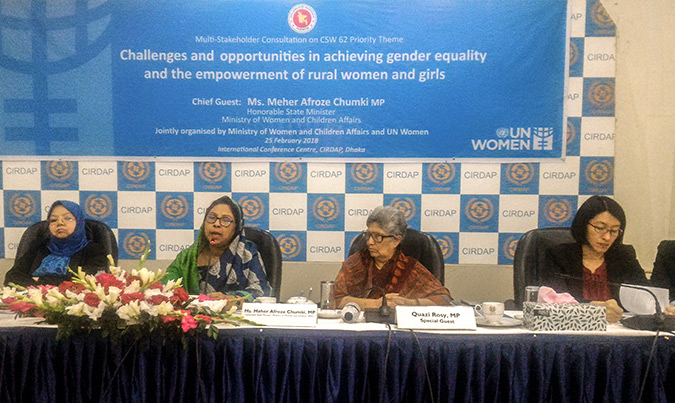Bangladesh holds consultation rural women ahead of Commission on the Status of Women
Date:
Author: Samara Mortada
Dhaka, Bangladesh — The rural women of Bangladesh have learned much about overcoming gender inequality amid the other challenges of development. Their experiences and recommendations were shared at a multi-stakeholder consultation in Dhaka, ahead of the 62nd session of the Commission on the Status of Women (CSW), to be held in New York from March 12.

This year's CSW priority theme is "Challenges and opportunities in achieving gender equality and the empowerment of rural women and girls". The consultation in Dhaka on February 25 was to support the Government delegation in formulating its policies and practice-level recommendations on this topic.
"The needs of rural women have been overlooked across all countries," Shoko Ishikawa, Country Representative of UN Women Bangladesh, said at the event. "Because of their gender intersecting with geography limits their access to infrastructure, decent work opportunities and social protection, their needs and lives are diverse as well as multidimensional."
The event brought together government and civil society representatives to discuss the challenges faced by rural women, and to highlight points of dialogue that need to take place at this year's CSW. The chief guest was Ms Meher Afroze Chumki, Honorable State Minister for the Ministry of Women and Children Affairs.
Urgent interventions are needed in the effective implementation of gender-responsive laws, policies and regulations, as well as increased investment in information communications and technology (ICT), and water sanitation and hygiene (WASH) infrastructure and services, Ishikawa said. There is also a pressing need for the redistribution of unpaid care work, addressing gender-based violence and better access to justice, health information and services including for sexual and reproductive health, she said.
Worldwide, women earn less than men for the same work, and have less access to the better jobs across all sectors. They are also over-represented in the informal sector - where 97 per cent of Bangladesh's rural women work - where they are excluded from rights and benefits such as sick leave, maternity provisions, guaranteed working conditions, or the right to organize.
Minister Meher Afroze stated that salient features of good practices that have come out from Bangladesh need to be highlighted at the New York event. These include the progress made in getting technology in the hands of rural women, as well as the rights of garment workers and migrants. Other important points discussed were the rights of women in agriculture, property rights, women and disability, and the mobility of rural women. The question was also raised of whether the emphasis on education is actually leading towards the empowerment of women.
Civil society representatives participating in the Dhaka consultation highlighted the need to recognize the plight of the most marginalized minority groups such as women from the lower-ranking Dalit caste, religious minorities and women working in tea plantations in conditions equivalent to bonded labour. Government representatives including Ms Meher Afroze pledged to continue to support rural women's advancement through skills development, support for women's entrepreneurship development and promoting the use of ICT, and commitment in leaving no one behind.